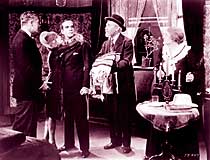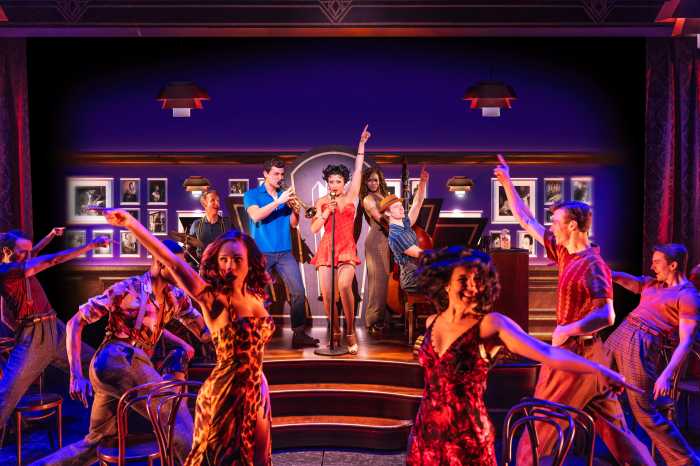Encouraged by the success of last spring’s
first annual Brooklyn Jewish Film Festival at BAM Rose Cinemas,
Park Slopers Paul Rothman and Jackie Lew have expanded this year’s
festival from four days of 15 films to six days of 19 films.
The festival, which begins on April 17 and runs through April
22, will focus on the phrase "Alle brider," or "We
are all brothers." Many of these shorts, documentaries and
features will explore the relationships between blacks and Jews,
particularly in Brooklyn. Other films celebrate Jewish musicians,
singers and songwriters – jazz, Israeli, cantorial – often in
collaboration with black musicians.
Rothman told GO Brooklyn that blacks and Jews in Brooklyn have
a "shared history, sometimes as strangers. The movies we’re
showing reflect the wide range of opinion on racial reconciliation,
some optimistic and some less so. Music has always been a meeting
place for blacks and Jews."
Uniting these two themes is Fort Greene-based filmmaker Joel
Katz’s "Strange Fruit" (2002), showing April 18 and
April 19. His documentary presents the history of the anti-lynching
song "Strange Fruit," famously sung by Billie Holiday
(1915-1959) and written by Abel Meeropol, a Jewish teacher at
Clinton High School in the Bronx.
"Jazzman from the Gulag" (1999), directed by Pierre-Henry
Salfati, screening on April 18 and April 19 enlarges this exploration
by illustrating the life of the great trumpet player Eddie Rosner,
who Louis Armstrong himself nicknamed the "White Louis Armstrong."
Rosner played with the Weintraub Syncopators – one of the more
famous jazz groups in Germany during the ’30s and ’40s, then
fled to the Soviet Union, where he came under Stalin’s persecution.
Most of the films will be introduced by relevant personalities
or followed by panel discussions.
"Brownsville Black and White," showing on April 19,
directed by Richard Broadman, which examines 60 years of black-Jewish
cooperation and conflict, will be followed by a panel discussion
with executive producer Laurann Black (who completed the film
after Broadman’s death) and Wendell Pritchett, author of "Brownsville
Brooklyn: Blacks, Jews, and the Changing Face of the Ghetto."
"It’s a wonderful example of something beautiful falling
apart," Rothman says of the film’s subject matter, recalling
such collaborative efforts as the naturally integrated boys’
clubs that sponsored champion sports teams – all destroyed through
urban development, Robert Moses, housing projects and the teachers’
strike of the 1960s, which pitted mostly Jewish teachers against
blacks calling for more local control of the schools.
Brooklyn Borough President Marty Markowitz will introduce a free
screening of Anna Deavere Smith’s solo docudrama "Fires
in the Mirror" (1991) on April 21, in commemoration of the
effort to heal the rifts following the 1991 Crown Heights riots.
In the film, Smith portrays a variety of actual neighborhood
residents, both black and white, delivering first-person accounts
of the event.
Activist Richard Green, founder and director of the Crown Heights
Youth Collective, and members of Mothers to Mothers, an organization
of African-American, Caribbean-American and Jewish women from
Crown Heights will participate in a panel discussion following
the screening.
Also on April 21, the film festival and the Anti-Defamation League
of B’nai B’rith will present an award for promoting human dignity
to director-writer Michael Roemer and producer-writer Robert
Young (both Jewish) following the screening of their groundbreaking
film "Nothing But a Man" (1964). In the film, Ivan
Dixon ("A Raisin in the Sun") stars as a railroad worker
who tries to settle down with a schoolteacher, played by jazz
giant Abbey Lincoln and is forced to deal with devastating prejudice,
inter-family difficulties and his own past.
A panel discussion with Roemer, Lincoln, writers Stanley Crouch
and Nat Hentoff, and film critic David Sterritt about combating
racism through film will follow.
Black filmmaker Madeleine Ali will be on hand to answer questions
after the screening of her film "Black to the Promised Land"
(1991) on April 22. The film documents the journey of 11 black
teenagers from Bedford-Stuyvesant who are taken by their Jewish
high school teacher to live and work on a kibbutz in Israel for
10 weeks.
Rothman, who hopes to have some of those students, now in their
late-20s, at the screening, said the film shows "how the
attitudes and prejudices of both groups change."
The festival also features films on less weighty matters, such
as the landmark film "The Jazz Singer" (1927) introduced
by NPR radio host Phillip Lopate on April 20, which will be followed
by Max Nosseck’s "Overture to Glory" (1940) based on
the same legend of a cantor who wants to sing secular, popular
music, featuring the world-famous cantor Moishe Oysher as a Vilna
cantor seduced by the opera (Yiddish with English subtitles).
But although these films focus on the lighter side of the Jewish
experience, they too are vital in forming bridges between Jews
and the other ethnic groups in Brooklyn.
"One of our goals is to explain the full totality of Jewish
culture including our lives in Brooklyn," said Rothman.
"We live with other groups in Brooklyn. That’s very topical
and relevant."
The Second Annual Brooklyn Jewish Film
Festival takes place April 17-22 at BAMcinematek. Tickets are
$9, $6 students, seniors, children under 12 and BAM Cinema Club
members. Tickets are available at the BAM Rose Cinema box office,
by phone at (718) 777-FILM or online at www.bam.org. For a complete
list of festival films and times, call the BAMcinematek hotline
at (718) 636-4100 or visit www.bam.org.

























